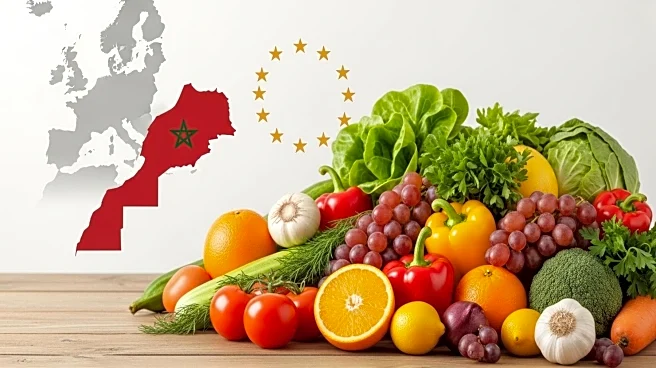What's Happening?
The European Union (EU) and Morocco have signed an amended agricultural agreement in Brussels, marking a significant step in their strategic partnership. This agreement allows agricultural products from Morocco's southern provinces to access the European market under the same preferential conditions as other Moroccan products. The agreement, signed by Morocco's ambassador to the EU, Ahmed Réda Chami, is set to be provisionally applied while awaiting final internal procedures. It aims to facilitate product access and improve consumer information through labeling, specifically mentioning production regions such as 'Laayoune-Sakiat el Hamra' and 'Dakhla-Oued Eddahab'. This development builds on a previous exchange of letters in 2018, reinforcing Morocco's position as the EU's main economic partner in Africa and the Arab world.
Why It's Important?
This agreement is crucial for strengthening the economic ties between Morocco and the EU, potentially boosting Morocco's national agricultural GDP and supporting employment and investment, particularly in its southern provinces. The enhanced access to the European market could lead to increased agricultural exports, benefiting Moroccan farmers and the broader economy. For the EU, this agreement solidifies its strategic partnership with a key African and Arab world partner, potentially leading to more structured cooperation in various sectors. The deal also reflects a mutual commitment to deepening long-standing partnerships, which could have broader geopolitical implications in terms of trade and diplomatic relations.
What's Next?
The agreement's provisional application suggests that both parties will work towards completing the necessary internal procedures for its full implementation. This could involve further negotiations or adjustments to ensure compliance with both Moroccan and EU regulations. The successful implementation of this agreement may pave the way for future collaborations in other sectors, potentially leading to a more comprehensive strategic partnership. Stakeholders, including agricultural producers and trade officials, will likely monitor the agreement's impact on trade volumes and economic growth closely.









